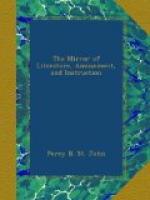more effectually and beneficially. The movers
in this project were some of the more intelligent
and persevering subscribers to a New Light and Heat
Company, projected by Mr. Winsor. They were opposed
by some on the ground of their designs being visionary
and fraught with danger; and by Mr. Murdoch on the
plea of priority of invention, which entitled him to
exclusive privileges if he chose to avail himself of
them. This gave rise to a long and minute investigation
of the subject before a committee of the House of
Commons. The application terminated unsuccessfully;
and the testimony of Mr. Aceum, exposed him to the
animadversions of Mr. Brougham. In 1810, however,
the application was renewed by the same parties, and
though some opposition was encountered, and considerable
expense incurred, the bill passed, but not without
great alterations; and the present London and Westminster
Chartered Gas-Light and Coke Company was established.
The proceedings of this company after the act was
obtained comprise a most important period in the history
of this invention. During the first few years
of their operations large sums of money were expended
in experiments, and very few beneficial results were
obtained. The undertaking was complicated and
difficult, and not only required the guidance of experience,
but the assistance of a scientific education and a
fertile invention. These requisites were found
in the person of Mr. Samuel Clegg, under whose able
direction and superintendence the principal works
of the company, at their different stations, were
erected. From this period various improvements
were gradually introduced into almost every part of
the apparatus. In 1816, Mr. Clegg obtained the
patent for his horizontal rotative retort; his apparatus
for purifying coal gas with cream of lime; for his
rotative gas meter; and self-acting governor; and
altogether by his exertions the London and Westminster
Company’s affairs assumed a new and flattering
aspect.
For reasons which are not assigned, in 1817, Mr. Clegg
retired from the service of this establishment.
In this year, 1817, at the three stations belonging
to the Chartered Gas Company, twenty-five chaldron
of coal were daily carbonized, producing 300,000 cubic
feet of gas, which was equal to the supply of 75,000
Argand lamps, each yielding the light of six candles.
At the City Gas Works, in Dorset-street, Black-friars,
the quantity of coal daily carbonized amounted to,
three chaldron, which afforded a quantity of gas adequate
to the supply of 1,500 Argand lamps; so that twenty-eight
chaldron of coal were daily carbonized at that time,
and 76,500 lights supplied by those two companies
only.
At this period the principal object of attention in
the manufacture of gas was its purification.
Mr. D. Wilson, of Dublin, took out a patent for purifying
coal gas by means of the chemical action of ammoniacal
gas. Another plan was devised by Mr. Reuben Phillips,
of Exeter, who obtained a patent for the purification
of coal gas by the use of dry lime. Mr. G. Holworthy,
in 1818, took out a patent for a method of purifying
it by causing the gas, in a highly-condensed state,
to pass through iron retorts heated to a dark red.
For this object and several others, having in view
improvements upon the ordinary method, many other
patents were procured.




